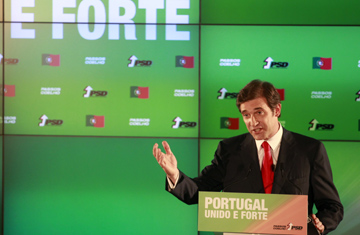
Social Democrat PSD party leader Pedro Passos Coelho talks to his supporters after the results announcement of the Portuguese general elections in Lisbon June 5, 2011
It may have been the politician's practiced habit of emotional concealment, but in his concession speech last night, the smiling outgoing Portuguese Prime Minister José Socrates hardly looked like a man distraught with defeat. Nor, for that matter, did his opponent, Paulo Passos Coelho, seem gleeful with triumph. In fact, all of Lisbon seemed subdued, greeting news of the victory of Passos Coelho's center-right Social Democrat party (PSD) with little more than a bit of flag-waving and a few dozen honking cars cruising the Avenida de Liberdade. The muted response was a clear reminder, if anyone needed it, that leading the Portuguese government isn't such a great job these days.
The PSD won 38.63% of the vote in Sunday's election, versus the Socialists' 28.05%. The margin of victory was wider than many polls had predicted, but was still not enough to give Passos Coelho's party a majority in parliament. He is expected to form a coalition with the right-wing Social Democratic Center (CDS) party.
And that is precisely what some analysts are hoping for. "The best chance for a solution to our economic woes lies with a right-wing coalition government," says Andr Freire, a sociologist who specializes in electoral politics at the University Institute of Lisbon. "Not so much because of the policies themselves, but because they can work together in a way that the Socialists haven't been able to. It's our best shot for a stable government."
Much hangs in the balance. When Sócrates failed in April to persuade the country's three other leading parties to support an additional round of austerity measures, his government collapsed, forcing snap elections. In the meantime, he stayed on as the head of a caretaker government while Portugal negotiated a £78-billion bailout package from the European Union and the International Monetary Fund.
Which party is in the best position to meet the terms of that package while jump-starting the Portuguese economy has been the main — some would say the sole — issue in these elections. The PSD plan, which goes even further in some cases than the measures demanded by the IMF, includes tax increases, pension reductions, and long-term economic reforms such as dramatically trimming the civil service and privatizing many industries, including (at least partially) Portugal's one public bank. Parties on the left have balked at those proposals and have promised to protect social welfare.
In its broad victory, the PSD believes it has a mandate for its proposed reforms. "Portugal will honor its commitments," said Passos Coelho in his speech Sunday night. "It's going to be hard. But it's going to be worth it."
That simple guarantee may be enough to explain the PSD's victory. "The Portuguese have internalized the message that we've been living beyond our means and are prepared to make some sacrifices," says Manuel Villaverde Cabral, a political scientist at the University of Lisbon. "What people are most afraid of is lack of change."
But others see the results less as an embrace of the PSD than — as other left-leaning governments in Europe have experienced--a rejection of the Socialists. "Sócrates is very unpopular," says sociologist Freire. "He has said one thing and then another too many times. Many people voted just to get rid of him." Nuno Madeira was one of them. The 48-year-old arts teacher cast his ballot early Sunday morning for the PSD, a change for someone who had previously considered himself a lifelong Socialist. "I voted for Scrates in the last two elections," says Madeira. "And he disappointed me."
On Monday, the victorious Passos Coelho was already at work hammering out the conditions of a coalition with the CDS. Even with the advantage of a stable government, his will hardly be an easy job. Unemployment stands at 12% in Portugal — the highest level in recent history — and the outgoing finance minister, Fernando dos Teixeiro, has predicted that the country's economy will contract 2% in each of the next two years, a prediction worse even than the IMF's.
Those conditions have resulted in a notable lowering of expectations, even when it comes to new governments. "I'm less pessimistic than I was on Friday," says political scientist Villaverde Cabral. "Now I think we might get out of this without getting kicked out of the euro zone."
Hardly a ringing endorsement, but perhaps the best Portugal can hope for these days.
